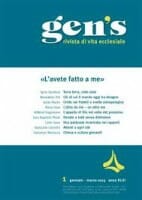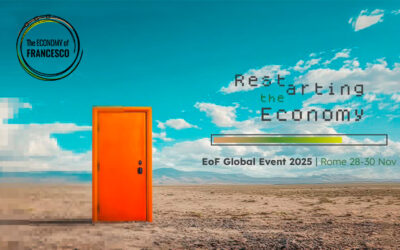 “Mercy: the word reveals the very mystery of the Most Holy Trinity. Mercy: the ultimate and supreme act by which God comes to meet us. Mercy: the fundamental law that dwells in the heart of every person who looks sincerely into the eyes of his brothers and sisters on the path of life. Mercy: the bridge that connects God and man, opening our hearts to the hope of being loved forever despite our sinfulness.” These are the words of Pope Francis in the Bull of Indiction with which he announced the Jubilee Year of Mercy on April 11, 2015. God “does not limit himself merely to affirming his love, but makes it visible and tangible. Love, after all, can never be just an abstraction. By its very nature, it indicates something concrete: intentions, attitudes, and behaviours that are shown in daily living.” Pope Francis clearly does not intend to exclude fidelity to the truth and doctrinal clarity, but rather combine them with the reality which people live. And not to yield to compromise, but to be faithful to the God whose Truth fulfilled is Love. A freeing message which leaves no one out. This is the platform upon which the two Synods of Bishops on the family are moving forward. A path to be lived — as stated in the Lineamenta, sent to the dioceses in view of the upcoming Assembly– ” to read both the signs of God and human history, in a twofold yet unique faithfulness which this reading involves,” facing with realism the family of today and keeping at the same time, ” our gaze fixed on Christ to ponder, with renewed freshness and enthusiasm, what revelation, transmitted in the Church’s faith, tells us about the beauty, the role and the dignity of the family:” The Gospel of the family. Fidelity, on the one hand, to God’s design which “is to be understood not as a “yoke” imposed on persons but as a “gift”, ” as “good news” which places itself in the service of the deeper fulfillment and happiness of people; but fidelity, on the other hand, to people in what they live and often suffer in a complex society with an interiority -one’s own and that of others- not less complex, from which numerous vulnerabilities originate. The key phrase is the art of accompaniment. In this regard, Pope Francis highlights in Evangelii gaudium: ” without detracting from the evangelical ideal, they need to accompany with mercy and patience the eventual stages of personal growth as these progressively occur.” It is always necessary to learn to ” remove our sandals before the sacred ground of the other (cf. Ex 3:5). The pace of this accompaniment must be steady and reassuring, reflecting our closeness and our compassionate gaze which also heals, liberates and encourages growth in the Christian life.” In fact, ” Someone good at such accompaniment does not give in to frustrations or fears. He or she invites others to let themselves be healed, to take up their mat, embrace the cross, leave all behind and go forth ever anew to proclaim the Gospel.” A demanding agenda which the Church is called to carry out–as the Lineamenta states–” with the tenderness of a mother and the clarity of a teacher (cf. Eph 4:15).” That’s right, “The Church:” not only the bishops and the priests, but the entire People of God. ” Without the joyous testimony of married people and families, domestic churches, proclamation, even if done in its proper way, risks being misunderstood or lost in a flurry of words that is characteristic of society today.” The complete text in Italian, with reflections and testimonies, is found in: Periodical of Church life: Gen’s.
“Mercy: the word reveals the very mystery of the Most Holy Trinity. Mercy: the ultimate and supreme act by which God comes to meet us. Mercy: the fundamental law that dwells in the heart of every person who looks sincerely into the eyes of his brothers and sisters on the path of life. Mercy: the bridge that connects God and man, opening our hearts to the hope of being loved forever despite our sinfulness.” These are the words of Pope Francis in the Bull of Indiction with which he announced the Jubilee Year of Mercy on April 11, 2015. God “does not limit himself merely to affirming his love, but makes it visible and tangible. Love, after all, can never be just an abstraction. By its very nature, it indicates something concrete: intentions, attitudes, and behaviours that are shown in daily living.” Pope Francis clearly does not intend to exclude fidelity to the truth and doctrinal clarity, but rather combine them with the reality which people live. And not to yield to compromise, but to be faithful to the God whose Truth fulfilled is Love. A freeing message which leaves no one out. This is the platform upon which the two Synods of Bishops on the family are moving forward. A path to be lived — as stated in the Lineamenta, sent to the dioceses in view of the upcoming Assembly– ” to read both the signs of God and human history, in a twofold yet unique faithfulness which this reading involves,” facing with realism the family of today and keeping at the same time, ” our gaze fixed on Christ to ponder, with renewed freshness and enthusiasm, what revelation, transmitted in the Church’s faith, tells us about the beauty, the role and the dignity of the family:” The Gospel of the family. Fidelity, on the one hand, to God’s design which “is to be understood not as a “yoke” imposed on persons but as a “gift”, ” as “good news” which places itself in the service of the deeper fulfillment and happiness of people; but fidelity, on the other hand, to people in what they live and often suffer in a complex society with an interiority -one’s own and that of others- not less complex, from which numerous vulnerabilities originate. The key phrase is the art of accompaniment. In this regard, Pope Francis highlights in Evangelii gaudium: ” without detracting from the evangelical ideal, they need to accompany with mercy and patience the eventual stages of personal growth as these progressively occur.” It is always necessary to learn to ” remove our sandals before the sacred ground of the other (cf. Ex 3:5). The pace of this accompaniment must be steady and reassuring, reflecting our closeness and our compassionate gaze which also heals, liberates and encourages growth in the Christian life.” In fact, ” Someone good at such accompaniment does not give in to frustrations or fears. He or she invites others to let themselves be healed, to take up their mat, embrace the cross, leave all behind and go forth ever anew to proclaim the Gospel.” A demanding agenda which the Church is called to carry out–as the Lineamenta states–” with the tenderness of a mother and the clarity of a teacher (cf. Eph 4:15).” That’s right, “The Church:” not only the bishops and the priests, but the entire People of God. ” Without the joyous testimony of married people and families, domestic churches, proclamation, even if done in its proper way, risks being misunderstood or lost in a flurry of words that is characteristic of society today.” The complete text in Italian, with reflections and testimonies, is found in: Periodical of Church life: Gen’s.
Yes to God
Yes to God




0 Comments